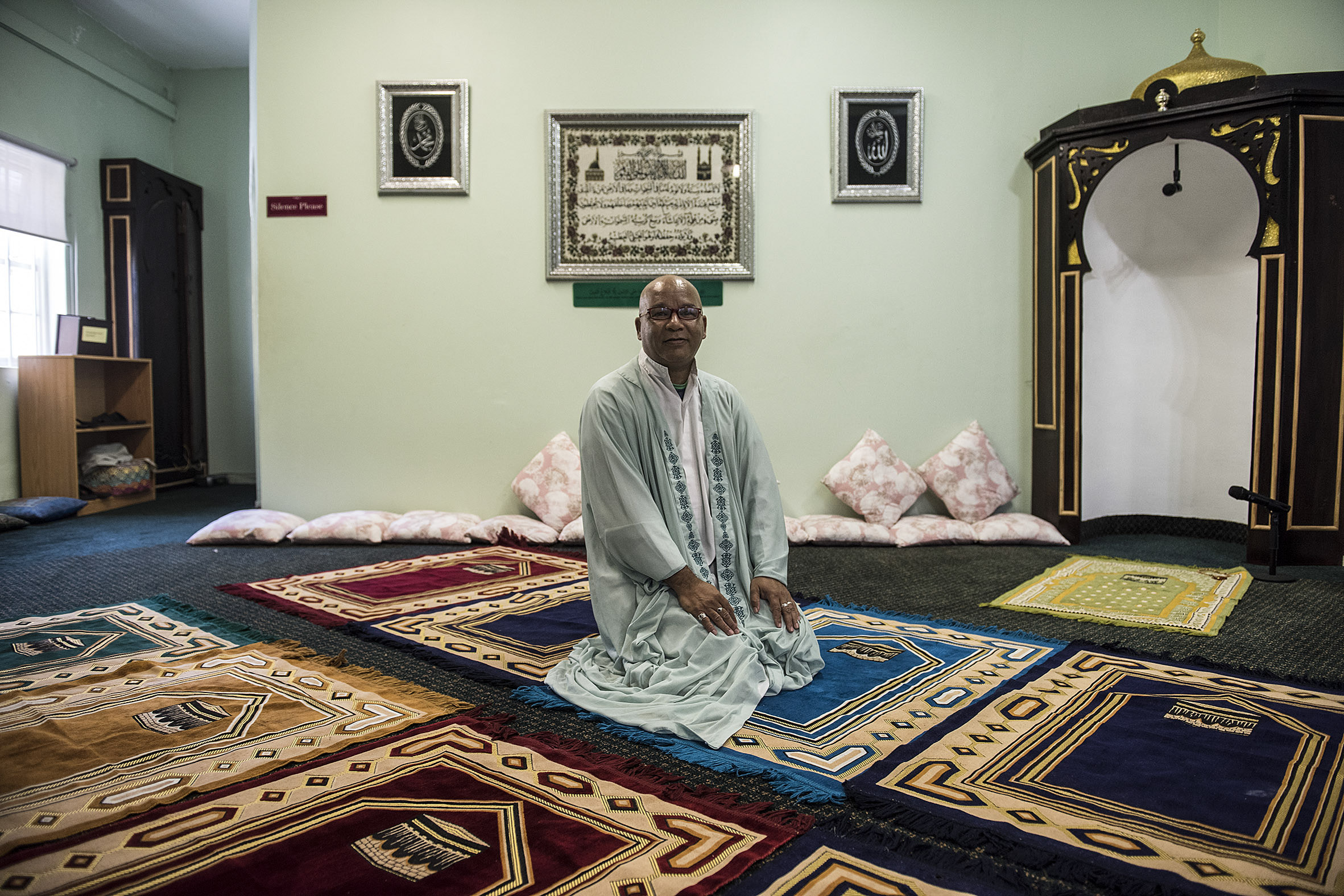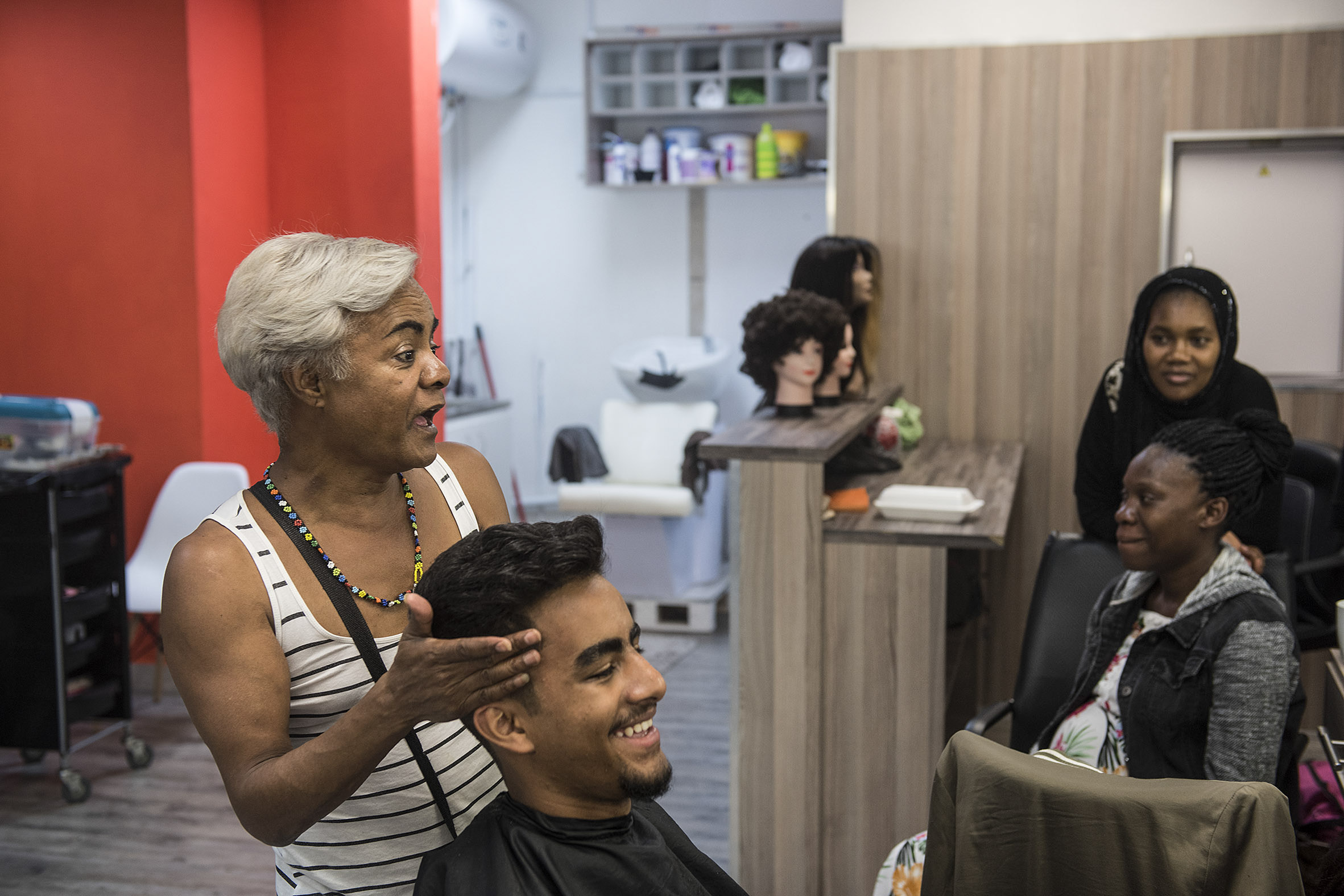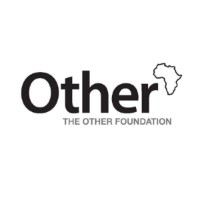Forward in faith: Mogamat Benjamin is a devout Muslim who believes others should accept him for who he is: a proud gay man. (David Harrison/M&G)
Bearded and dressed in a thawb and kufiah, Mogamat Benjamin is, in appearance at least, much like any other Muslim man. His eye-catching walking stick, covered in tiny, shiny blue-and-pink flowers, however, hints at something different — the time when, competing in drag beauty pageants, he was better known under his stage name, Kafunta.
Sitting at a coffee shop a little more than a block away from Cape Town’s District Six Museum, the 61-year-old says he took the name from one of his favourite singers, PP Arnold’s 1968 album.
“You know her records?” he asks. Not waiting for a response, he whips out his phone and plays one of her songs, Letter to Bill. Smiling, he sings along to the tinny sounds of the lyrics: “I still remember the good times we had/ When we thought that life was just a game.”
It was in District Six, where he was born and raised before being evicted along with thousands of others, that Benjamin says he had many good times. “We were always three. There was Freddy, whose name was Debbie Reynolds; Saan, who was Sharon Tate and became Mandy. And of course myself, Kafunta. We were always wonderful, wonderful, wonderful together.”
The day we meet is the same day on which the Sultan of Brunei, Hassanal Bolkiah, implements a penal code, based on Sharia law, that decrees homosexuality is punishable with death by stoning.
“It’s terrible. Really sad,” Benjamin says. “These people have so much hatred in their hearts. I don’t think the world will allow them to do this, because God is the ultimate judge.”
Although the situation for queer Muslims in South Africa is far from the life-threatening one in the tiny country on the island of Borneo, judgment is something Benjamin has lived with for most of his life.
“It was difficult,” he says. “They would always call us names like ‘moffie’ or ‘tahoera’, which basically means you’re not a real woman.”
Life at home was only marginally better. “My father had a problem with it,” he says. “But he at least didn’t make it too much of a problem [for me], because there were two gays in the family,” he adds, his eyes glowing mischievously. “My younger brother was also gay. He passed away, but was very beautiful. Even more beautiful than me. And he also competed [in drag competitions].”
Benjamin’s years of entering and winning drag beauty contests are something he speaks of with pride. That, and his 28 years of leading the city’s annual Tweede Nuwe Jaar processions, “dancing in dresses”.
“I started with the Odds and Ends, then for the Broadways, then the Spes Bonas. And so many others. And I was always in front. Always in drag,” he smiles, adding that, generally, he mostly wore ordinary clothes.
“When we went out to a party, then we would drag. My favourite outfit was always hotpants and a lovely wedge heel. And if I wore a dress, I always wore minis, because I had lovely legs.”
Benjamin says that being an openly gay man who regularly donned mini-skirts to display said lovely legs in no way detracted from him practising his faith. “We always went to mosque. We trawie’d [night prayers] and fasted. I’m still very much a practising Muslim. Always was. And there are a lot of us girls who are still practising Muslims.”
It was in 1997, after returning from Hajj, that Benjamin swapped his dresses for Islamic wear.
Keen to have him fully renounce his past, his uncle approached him after his return, demanding he burn photographs of his life as a drag queen. “He said to me, ‘That part of your life is now gone.’ ”
He might have burnt the photographs, but “I still went out with my friends. It’s just that we wouldn’t go to bars. Now and then we would go to parties. I vouched that I was not going to leave my friends. I thought to myself, let’s inspire some of them to also go for Hajj.”
Benjamin’s stubborn unwillingness to separate himself from his friends was matched by his continued adherence to his faith.
“Islam is very great to me. I would never forsake Islam. Not for anything. You see, some people portray that Islam doesn’t like gays. No. If you lived in District Six — all those people were living with gays around them. And they weren’t anti, because Islam is a complete way of life. And it does not bar gays from being what they are. It’s just that gays must know their place in a mosque. We can’t come in make-up or in a dress. It’s the same as with a church. I mean, you’re not going to make love to someone in a church or be frivolous with someone. A masjid is the same,” he shrugs matter-of-factly.
Two days later, in a nondescript office building in an industrial part of the Cape Town suburb of Wynberg, people are arriving for the weekly Friday prayers at a masjid with a difference.
They’re not a stereotypical mix: a lesbian couple walking hand-in-hand; a young white man with nails painted alternately green and red; a transgender woman in killer heels and tight jeans, her head modestly covered in a tightly bound doek. A West African leads the sermon.
This is the Al-Fitrah Foundation, which aims “to create a global Muslim community free from discrimination based on sexual orientation and gender identity”.

It is here where, for the past three years, Mogamat Mohammed (47), dressed in a prayer robe almost identical in shade to the pale green interior of the masjid’s walls, has been working. “I just fell in love with the work they do here,” he says.
And although these matching colours might serve as an unwitting testament to his newfound sense of belonging, feeling at home with his sexuality and religious beliefs has been a life-long struggle. Born into a conservative Muslim family, his coming out “about 10, 15 years ago” shocked his family.
“They said, ‘No, this is not you, you must go more into religion.’ They started not wanting me to go out with friends any more, to stay at home and only do religious things. They kept a hold on me, removed my cellphone from me.”
After months of enduring this, he decided on a way out. “And like many queer Muslim people do, I decided to get married. Just to get out of the house. I found a girl. She knew about me, so she was thinking she could change me. But I had a hidden agenda. I just wanted to get out of the house,” he says.
On the day he was to get engaged to her, “I spoke to Allah. I said, ‘Send me a sign that this is wrong what I am doing and I will accept whatever you send me.’ I drove to my partner at the time to tell him I was going to get engaged that night. I just felt I had to do the right thing and tell him. Maar daar was ’ie tyd om vir hom te sê nie. Want toe ek na sy straat toe kom, toe kry ek ’n ongeluk [But I didn’t get a chance to tell him, because as I was approaching his street, I was involved in a car accident]. I just said to Allah, ‘You gave me the answer — it’s the wrong thing I am doing.’ ”
Still, the engagement ceremony took place while he was in hospital.
He spoke to Allah again after he left the hospital. “As Muslims we do tahajud salaah, the prayer you do in the early hours of the morning, where you speak to Allah if you are troubled or have problems in your life. I made two rakaats and spoke to Allah to help ease my difficulties. Shortly after that, one morning at breakfast, her parents came around to say the engagement is off. The reason, according to them, was that she felt I am still gay and not changing. At that moment, I said to myself, ‘Shukr Allah for giving me the answer.’ ”
Mohammed says that although reconciling his faith with his sexuality was difficult, turning his back on Islam was something he never considered.
“Because I felt that I could always speak to Allah. And that Allah is there for me, giving me what I want. I know it’s wrong what I am doing. It’s wrong in the Qur’an. But this is what Allah made me. It weighs a lot on me, yes. But it’s about the self. About you and your maker. I might be queer but I am Muslim and can do the same things any other Muslim does. How many building contractors aren’t there that are queer? It’s the same thing. I always say, ‘Hy wat die muur maak mag skeef is, maar daai muur gaan straight is [The person who builds a wall might be bent, but that wall will stand up straight]’,” he laughs, before adding: “The thing is, once you accept yourself for who and what you are, you’ll have a better life. You’ll feel better inside.”
For many queer men, few things serve as strong a testimony to self-acceptance as drag artistry.
That evening, a drag beauty pageant is being held at a Mitchell’s Plain club. Contestants entering the Miss Las Vegas Lounge Legends competition have to be at least 35 years old. Backstage, in the makeshift dressing room, the women are chattering as they catch up, squeezing no-longer-nubile bodies into tiny bathing costumes and getting their hair and make-up done. One hanger-on quips: “Vanaand is al ’ie Slamse moffies hier [all the Muslim gays are here tonight].”
Ighshaan Lewis is one of them. Sitting quietly in a corner, Lewis — or Samantha Fox, as he is better known — stares at his reflection as the make-up artist gets to work.
A little while later, sashaying on to the floor to rapturous applause from the crowd, Lewis, the oldest contestant at 58, exudes 1930s old-school glamour. “I’ve been doing this for almost six decades,” he croons into the microphone in response to one of the MC’s questions.
“Ooh, daai Hollywood voice! Sy’s ’n regte diva, ne? [Oh, that Hollywood voice! She’s a real diva, hey?],” someone remarks.
Two days later and Lewis takes a break between clients at the hair salon he works at to tell me he is happy with having clinched the competition’s Ms Personality title.
Born in District Six, his first foray into the world of drag competitions started at the age of 17. “That’s, my God, how many years now?” he laughs. Eventually settling on Samantha Fox as a stage name came “because choosing a Muslim name was not gonna work. Because, jy weet hoe gaan die Muslims aan van die half-kaalgeid en so [you know how the Muslims can carry on about the half-nudity and so on]. So I chose a Christian name.”
Although a devout Muslim, Lewis says he no longer attends mosque “because of the obstacles and things. Jy weet hoe is som van hulle. ‘Wat soek jy dan hier? [You know how some of them can be, saying things like, ‘What are you doing here?’]. You know mos how it goes. So I rather just pray at home or wherever I am.”

Comfort zones: While Ighshaan Lewis prefers to pray at home rather than attend mosque. (David Harrison)
As to whether he has ever considered abandoning his faith, Lewis is unequivocal. “No, no, no. I wouldn’t do that. I was born Muslim, so I will die Muslim. You see, Islam is such a sacred religion. So we just try to do the best we can, you know? Nowadays, when people say to me, ‘Dis haram’ [it’s forbidden] and all that, I just ignore them. Because, I mean, who are they to judge?”
Back at the Las Vegas Lounge, before the competition winners were announced, the MC calls on Benjamin to address the crowds, introducing him as “one of our favourite legends, Kafunta”.
Delivering his short speech, Benjamin, dressed in a black salaah top and trilby hat, is clearly in his element. Later, his bright walking stick tucked away under a nightclub table, he takes to the dance floor with friends. An all-too familiar track blasts from the speakers and Kafunta and his friends sing headily along: “Did you think I’d crumble/ Did you think I’d lay down and die?/ Oh no, not I, I will survive.”
“You see,” Benjamin said a few days earlier, as we sat on the coffee shop pavement, “the thing is this: my mentality is that people must accept me for who I am. And why must I tell lies? Why must I live a lie? This is my life.”
Carl Collison is the Other Foundation’s Rainbow Fellow at the Mail & Guardian
